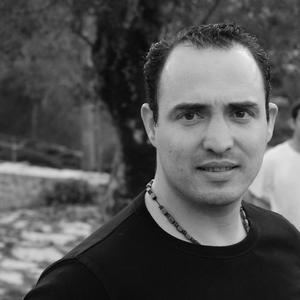Short presentation
Luca Antonio Dimuccio was born in 1971 to Putignano (Bari - Italy). He finished his Earth Sciences five-year BSc/MSc in 1998 at Bari University (Italy), with a final thesis on karst and palaeokarst geology and geomorphology of the Outil/Cantanhede Plateau (western-central Portugal), with a final mark of 100/110 (equivalent to 18/20 in Portugal, pre-Bologna degree). In those years, he also worked in sedimentology, geomorphology, mineralogy, and hydrogeology in southern Italy and central Portugal. He spent one year (1995) at Coimbra University (Portugal) with an ERASMUS scholarship. Luca A. Dimuccio shifted to Portugal again to start a pre-Bologna doctorate in Geology (external geodynamic): Karstification of Coimbra Hills at South of Coimbra (western-central Portugal) - Depositional facies and stratigraphic controls of the (palaeo-)karst affecting the Coimbra Group (Lower Jurassic), which concluded in April 2015 with a final qualitative rating of excellent (summa cum laude, unanimity). He was Assistant (from December 2006 to April 2015), Assistant Professor (from April 2015 to February 2024) and Deputy Director (from April 2019 to April 2021) of the Department of Geography and Tourism at Coimbra University, as well as Vice-president (from 2017 to 2022) of the Portuguese Association of Geomorphologists (APGeom). Present-day Luca A. Dimuccio is a Geologist and Associate Professor of Physical Geography and Geomorphology at the Department of Geography and Tourism of Coimbra University. He is also an Integrated Researcher in the CEGOT I&D unit - Centre of Studies in Geography and Spatial Planning (Coimbra and Porto Universities) and a Collaborative Researcher in the UNIARQ I&D unit - Centre of Archaeology (Lisbon University). He also holds the positions of Deputy Director of the bachelor’s degree in Geography, Coordinator (Geography) of master’s in social dynamics, natural and technological risks, and Coordinator of international mobility (Geography) at Coimbra University. His scientific investigation focuses on carbonate sedimentology and stratigraphy, tectonic geomorphology, karst hydrogeology and geomorphology, cave geology, fluvial geomorphology, fluvial and karst geoarchaeology, as well as geological and geomorphological field survey and mapping. Luca A. Dimuccio is particularly interested in (palaeo-)karst inception and evolution, namely controlled by carbonate sedimentology and stratigraphy. From the geomorphological and geoarchaeological point of view, his research focuses on the Plio-Quaternary record, particularly on the Middle-to-Upper Palaeolithic transition, even if he may work on open-air and cave/rock-shelter sites of any chronology and context. His research centres on studying site formation processes, speleogenesis, paleoclimate, and the relationships between humans and the environment. Other research fields also included geographic information sciences techniques and tools, including artificial neural networks, for environmental study and territorial management (landslides, floods, groundwater pollution, and forest fire hazards/vulnerabilities).
CIÊNCIA VITAE: https://www.cienciavitae.pt/pt/1B1C-D535-FD7F
ORCID Researcher Page: http://orcid.org/0000-0002-3889-2492
ResearchGate: https://www.researchgate.net/profile/Luca_Dimuccio
